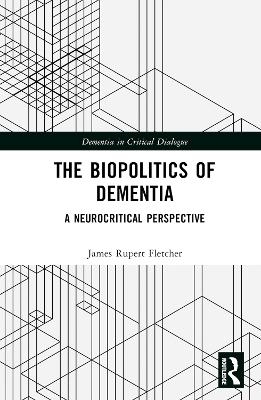
The Biopolitics of Dementia
Routledge (Verlag)
978-1-032-50446-9 (ISBN)
The book argues that a neuropsychiatric biopolitics of dementia positions dementia as a syndrome of cognitive decline, caused by discrete brain diseases, distinct from ageing, widely misunderstood by the public, that will one day be overcome through technoscience. This biopolitics generates dementia’s public profile and is implicated in several problems, including the failure of drug discovery, the spread of stigma, the perpetuation of social inequalities and the lack of support that is available to people affected by dementia. Through a failure to critically engage with neuropsychiatric biopolitics, much dementia studies is complicit in these problems.
Drawing on insights from critical psychiatry and critical gerontology, this book explores these problems and the relations between them, revealing how they are facilitated by neuro-agnostic dementia studies work that lacks robust biopolitical critiques and sociopolitical alternatives. In response, the book makes the case for a more biopolitically engaged "neurocritical" dementia studies and shows how such a tradition might be realised through the promotion of a promissory sociopolitics of dementia.
The Open Access version of this book, available at www.taylorfrancis.com, has been made available under a Creative Commons Attribution (CC-BY) 4.0 license. Funded by University of Manchester, UK.
James Rupert Fletcher is Wellcome Fellow in the Department of Sociology at the University of Manchester, UK. His research covers several areas of the dementia economy, with an emphasis on using social theory and methods to understand dementia as a political entity. He has published on subjects including informal dementia care networks, mental capacity legislation and its influence on research governance, the anti-ageing technoscience market, anti-stigma and awareness-raising campaigns regarding psychiatric disorder, the operationalisation of ethnicity and age in research, the biomarker discovery economy, the curation of dementia-friendly cultural events, dementia prevention public health strategies and environmental effects on cognition in urban settings. His lecturing spans medical sociology, the sociology of ageing, social research methods and ethical governance
1. Introduction: The Successful Failure of Dementia Research; 2. Studying Dementia: Post-1970s Divergences in Dementia Studies and the Alzheimer’s Movement; 3. Anti-(bio)medical; Neuro-agnostic: Why Dementia Studies Needs Neurocritical Responses to the Biopolitics of Dementia; 4. Deconstructing Biopolitical Commitments: A Neurocritical Analysis of Biogenic Disease, Normal Ageing and Promissory Futures80; 5. Making Dementia Curable: Circling Cognition, Biomarkers and Meaningfulness; 6. Destigmatising Normality: How the Awareness Economy Misconstrues and Perpetuates Stigma; 7. Moralising Ethnicity: Governance through the Racialisation of Outcomes; 8. The Political Economy of Dementia: Post-2008 Financialisation, Awareness-as-Welfare and Speculative Demographic Alarmism; 9. Conclusion: Promissory Sociopolitical Histories
| Erscheinungsdatum | 28.11.2023 |
|---|---|
| Reihe/Serie | Dementia in Critical Dialogue |
| Verlagsort | London |
| Sprache | englisch |
| Maße | 156 x 234 mm |
| Gewicht | 580 g |
| Themenwelt | Geisteswissenschaften ► Psychologie ► Allgemeine Psychologie |
| Geisteswissenschaften ► Psychologie ► Biopsychologie / Neurowissenschaften | |
| ISBN-10 | 1-032-50446-3 / 1032504463 |
| ISBN-13 | 978-1-032-50446-9 / 9781032504469 |
| Zustand | Neuware |
| Informationen gemäß Produktsicherheitsverordnung (GPSR) | |
| Haben Sie eine Frage zum Produkt? |
aus dem Bereich


